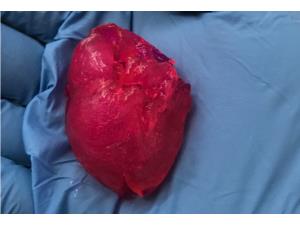



Date:10/09/19
 The Chicago-based biotech company BIOLIFE4D announced today that it has successfully 3D-bioprinted a mini human heart. The tiny heart has the same structure as a full-sized heart, and the company says it's an important milestone in the push to create an artificial heart viable for transplant.
The Chicago-based biotech company BIOLIFE4D announced today that it has successfully 3D-bioprinted a mini human heart. The tiny heart has the same structure as a full-sized heart, and the company says it's an important milestone in the push to create an artificial heart viable for transplant.
The heart was printed with patient-derived cardiac muscle cells, or cardiomyocytes, and bioink made from extracellular matrix compounds that replicate the properties of the mammalian heart. BIOLIFE4D first bioprinted human cardiac tissue in June 2018. Earlier this year, the company bioprinted individual heart components, including valves, ventricles and blood vessels. Its process involves reprogramming a patient's white blood cells into induced pluripotent stem cells (iPS cells), which can differentiate into different types of cells, including cardiac cells.
Eventually, the company hopes to bioprint a full-sized functioning human heart. Theoretically, bioprinted hearts could reduce or eliminate the need for donor organs. Of course, BIOLIFE4D isn't the only company looking to 3D print organs. Researchers at Tel Aviv University 3D printed a heart earlier this year. We've seen functioning 3D-printed silicone hearts, and bioengineers at MIT managed to 3D print complex vascular networks, like those necessary to sustain artificial organs.
Chicago biotech company 3D prints a mini human heart
 The Chicago-based biotech company BIOLIFE4D announced today that it has successfully 3D-bioprinted a mini human heart. The tiny heart has the same structure as a full-sized heart, and the company says it's an important milestone in the push to create an artificial heart viable for transplant.
The Chicago-based biotech company BIOLIFE4D announced today that it has successfully 3D-bioprinted a mini human heart. The tiny heart has the same structure as a full-sized heart, and the company says it's an important milestone in the push to create an artificial heart viable for transplant.The heart was printed with patient-derived cardiac muscle cells, or cardiomyocytes, and bioink made from extracellular matrix compounds that replicate the properties of the mammalian heart. BIOLIFE4D first bioprinted human cardiac tissue in June 2018. Earlier this year, the company bioprinted individual heart components, including valves, ventricles and blood vessels. Its process involves reprogramming a patient's white blood cells into induced pluripotent stem cells (iPS cells), which can differentiate into different types of cells, including cardiac cells.
Eventually, the company hopes to bioprint a full-sized functioning human heart. Theoretically, bioprinted hearts could reduce or eliminate the need for donor organs. Of course, BIOLIFE4D isn't the only company looking to 3D print organs. Researchers at Tel Aviv University 3D printed a heart earlier this year. We've seen functioning 3D-printed silicone hearts, and bioengineers at MIT managed to 3D print complex vascular networks, like those necessary to sustain artificial organs.
Views: 479
©ictnews.az. All rights reserved.Similar news
- Azerbaijani project to monitor disease via mobile phones
- Innovative educational system to be improved under presidential decree
- NTRC prolongs license of two TV and radio organizations for 6 years
- Azerbaijan establishes e-registry for medicines
- Azerbaijani museum introduces e-guide
- Nar Mobile opens “Nar Dunyasi” sales and service center in Siyazan city
- International conference on custom electronic services held in Baku
- OIC secretary general to attend COMSTECH meeting in Baku
- Azerbaijan develops earthquake warning system
- New law to regulate transition to digital broadcasting in Azerbaijan
- Azerbaijani State Social Protection Fund introduces electronic digital signature
- Intellectual traffic management system in Baku to be commissioned in December
- Tax Ministry of Azerbaijan started receiving video-addresses
- World Bank recommends Azerbaijan to speed up e-service introduction in real estate
- Azerbaijan to shift to electronic registration of real estate





















